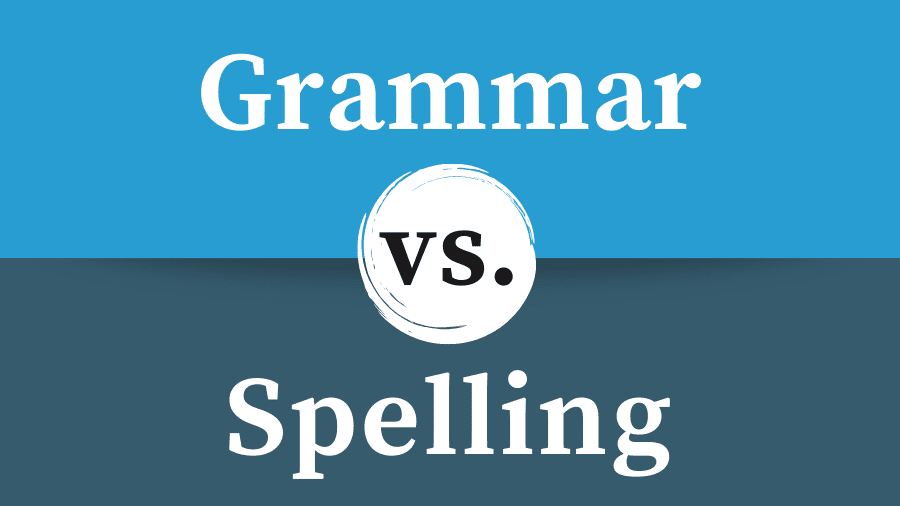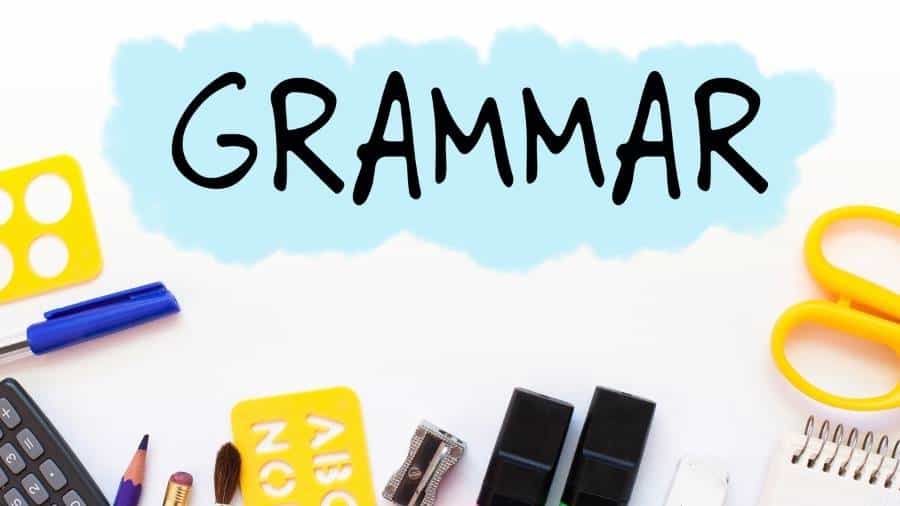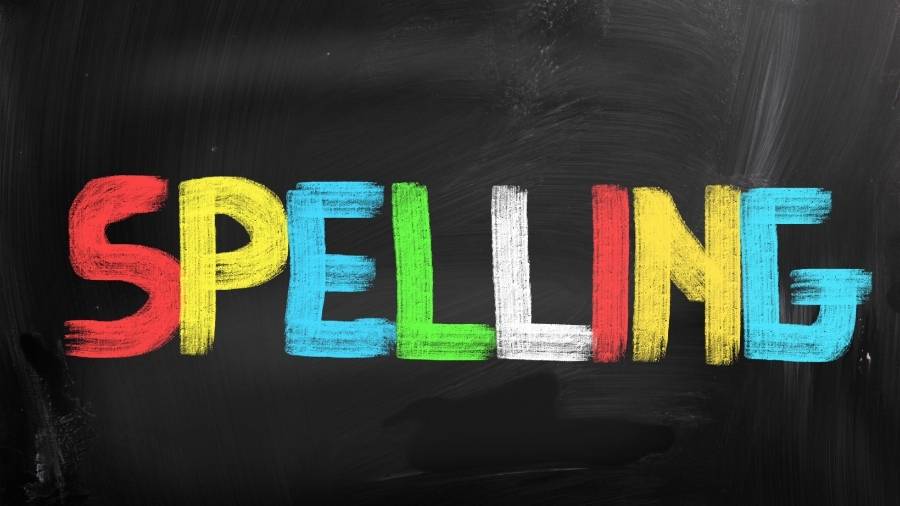This article may contain affiliate links. Please see our affiliate disclaimer in the footer menu for more information. Thank you for your support!

Grammar and spelling are both elements of writing. However, these two terms represent different concepts that merit their own discussion.
Grammar deals with how words change form and come together to make meaningful sentences. Spelling refers to how letters come together to form words. Both grammar and spelling are needed for clear written communication, but they’re not the same.
Let’s learn more about how spelling and grammar differ. We’ll also look at example sentences containing grammar gaffes and spelling snafus. 😊
Grammar vs. Spelling: What’s the Difference?
Here’s a summary of the differences between grammar and spelling.
Grammar vs. Spelling
| Grammar | Spelling | |
|---|---|---|
| Definition | order of words (also involves the parts of speech and how words change forms) | order of letters |
| Ease of Learning | requires critical thinking | requires memorization |
| Changes over Time? | very little | yes (quite slowly) |
| Best Applied How? | grammar book or style guide | dictionary |
We use grammar in speech and writing; however, spelling only applies to the written word.
Furthermore, grammar has to do with the order of words, and spelling is concerned with the order of letters.
Both grammar and spelling follow standard rules, but these rules have exceptions.
Spelling tends to be a bit easier to learn since it only requires memorization. However, it can take a long time to master English spelling. I remember having spelling tests for several years in elementary school.
While grammar changes very little over time, spelling evolves—slowly but surely.
For example, the word online used to be spelled as two words. Later, it became spelled with a hyphen: on-line. Now, we spell it as one word.
If you need a resource for grammar rules, a grammar book or style guide is your best bet.
As a proofreader, I refer to the grammar rules in The Chicago Manual of Style (CMOS). CMOS is a widely used and well-respected style guide that serves as the go-to guide in the US book publishing industry.
And what about a resource for spelling? The dictionary, of course, is your best bet for knowing how to spell words. You can also purchase a book about spelling rules or search the web to discover these rules.
Some people are naturally good spellers (congrats to any past spelling bee champions!), and others are not.
Luckily, for anyone who struggles with spelling, most of what we “write” these days happens on a computer with access to spell-check.
Just remember that spell-check doesn’t flag errors with homophones (e.g., they’re, their, and there). A grammar checker will detect many of them, but some can only be caught through careful proofreading.
Now let’s learn more about grammar and spelling, including how to correct a few common grammar and spelling blunders.
What Is Grammar?

Grammar relates to how words change form and join together to communicate information via sentences. Words change their form when they become plural, change tenses, etc.
Let’s check out CMOS for an expert definition of grammar.
“In its usual sense, grammar is the set of rules governing how words are put together in sentences to communicate ideas—or the study of these rules.”
Source: The Chicago Manual of Style, 17th Edition
CMOS also mentions that grammar generally focuses on the eight parts of speech and their syntax. In case you need a quick refresher, here are the eight parts of speech:
- nouns
- pronouns
- verbs
- adjectives
- adverbs
- prepositions
- conjunctions
- interjections
And what is meant by syntax?
Syntax refers to word order.
In English, we arrange words in a particular order to communicate clearly.
For example, what if I changed the order of the words arrange and words in that last sentence:
In English, we words arrange in a particular order to communicate clearly.
Now it sounds like we’re the words, and we need to put ourselves in the right order so that people can understand us. What? I’m completely confused.
Basically, I’m baffled. Puzzled and perplexed, perhaps. Bewildered, to be honest. Flat-out flummoxed, in fact!
Okay, I’m finished playing with words. Promise. 😊
So since I’m making a statement (not asking a question), the order should be subject (we) + verb (arrange) + direct object (words). If I change the word order, confusion ensues, and we become words.
In sum, grammar involves arranging words in the proper order for effective written and oral communication.
Examples of Grammar Mistakes
Grammar mistakes happen when we break conventional grammar rules. Here are ten examples of common grammatical errors:

- a mistake with subject-verb agreement
- an error with pronoun-antecedent agreement
- using the wrong pronoun case
- using the incorrect verb tense
- choosing an adverb where you need an adjective
- choosing an adjective where you need an adverb
- errors with the comparative and superlative forms of adverbs and adjectives
- using a pair of mismatched correlative conjunctions
- using the wrong preposition
- writing in incomplete sentences (fragments)
Let’s take a few of these errors and look at example sentences.
Example Sentences with Grammatical Mistakes
Example 1: Using the wrong pronoun case
Grammar Goof: Us proofreaders are eager to find grammar gaffes.
Here we need a pronoun in the subjective (aka nominative) case, not the objective case.
If we eliminate the word proofreaders, it’s easy to see that we need the pronoun we. We would say we are eager, not us are eager.
Good Grammar: We proofreaders are eager to find grammar gaffes.
Example 2: Choosing an adverb where you need an adjective
Grammar Goof: I feel badly that she couldn’t come with us.
We pair adjectives with linking verbs and adverbs with action verbs. Since feel is a linking verb, we need the adjective bad, not the adverb badly.
Good Grammar: I feel bad that she couldn’t come with us.
Example 3: Using a pair of mismatched correlative conjunctions
Grammar Goof: Neither Lucy or Roberto could remember the name of the island.
We use either with or and neither with nor.
Good Grammar: Neither Lucy nor Roberto could remember the name of the island.
What Is Spelling?

Spelling is the act of arranging letters in the correct sequence to form words. For example, we spell the word dog d-o-g. Spelling is closely related to orthography, which considers spelling and the sounds made by letters and other symbols.
To get an expert definition of spelling, let’s turn to the Merriam-Webster.com Dictionary.
“the forming of words from letters according to accepted usage”
Source: Merriam-Webster.com Dictionary
Most of us probably learned to spell phonetically. Phonetic spelling is spelling words based on how they sound. For example, a child may spell the word love l–u–v. 😊
Spanish is an excellent example of a language with straightforward spelling because the phonetic spelling is almost always correct. But English spelling is complicated.
I pity people trying to learn how to spell in English when we have words that start with silent letters, like pneumonia, gnat, knee, tsunami, hour, and wren.
Nevertheless, like grammar, spelling is an essential part of writing.
Examples of Spelling Mistakes
Spelling slipups happen for many reasons. Here are a few of the reasons why we misspell words.
- exceptions to standard spelling rules
- different ways to spell the same sound
- silent letters
- letters that take on more than one sound (e.g., the c in doctor vs. docile)
- confusion about single vs. double consonants
Let’s look at example sentences for a few of the reasons why we make spelling errors.
Example Sentences with Misspelled Words
Example 1: Exceptions to standard spelling rules
Spelling Stumble: Her parents often talked about how she was a fiesty child.
You’ve probably heard the rule i before e except after c. Well, let me tell you—this well-known rule is full of exceptions. You may have seen the popular meme with this message:
“i before e, except when your foreign neighbor Keith receives eight counterfeit beige sleighs from feisty caffeinated weightlifters. Weird.”
With so many exceptions to the rule, it’s easy to see why we could misspell the word feisty.
Spelling Star: Her parents often talked about how she was such a feisty child.
Example 2: Different ways to spell the same sound
Spelling Stumble: The big croud was excited to see the show.
The word crowd contains a digraph: two letters joined together that make one sound (e.g., ow, ee, sh). Some digraphs have more than one spelling despite making the same sound in certain words.
For example, the ow in crowd and the ou in loud make the same sound.
No wonder someone would be inclined to spell the word crowd with ou in the middle.
Spelling Star: The big crowd was excited to see the show.
Example 3: Silent letters
Spelling Stumble: She loves to eat rasberries all year long!
A silent p in the word raspberry? Really? It isn’t easy to spell a word correctly when it contains a letter you can’t even hear!
Spelling Star: She loves to eat raspberries all year long!
Frequently Asked Questions

Is a spelling mistake a grammatical mistake?
A spelling mistake is not a grammatical mistake; it’s an orthographic error. It indicates that a word has the wrong letters or sequence of letters (or both). A grammatical mistake means that a sentence contains the wrong word order or the incorrect form of a word.
Is a typo a grammatical error?
A typo is not a grammatical error—it’s a spelling error. Typo is short for typographical. A typographical mistake is a small slipup that happens when we type something we don’t mean to. For example, we may type teh instead of the.
How do I prevent grammar and spelling errors?
One of the best ways to prevent grammar and spelling errors is to proofread your writing. You can also use spell-check and a reliable grammar checker to catch mistakes you miss when proofreading. Finally, you can work to improve your grammar and spelling knowledge.
Do you want to learn some time-tested tactics for proofreading your writing? If so, you can check out my post about proofreading strategies.
Are you curious about what grammar checker I recommend? I use the premium version of Grammarly, but a free version is available too. I wrote an article about what Grammarly can (and can’t) do for you.
Finally, if you’d like to boost your grammar skills, you can read my article “15 Tried-and-True Tips to Improve Your Grammar.”
I hope this post helped you understand the differences between grammar and spelling.
I authored an article about grammar vs. punctuation if you’d like to see something similar.
Best wishes to you!
“Rest is not idleness, and to lie sometimes on the grass under trees on a summer’s day, listening to the murmur of the water, or watching the clouds float across the sky, is by no means a waste of time.”
– John Lubbock

Recent Posts
Punctuation is important because it enables us to communicate our message clearly and effectively. Without punctuation, we wouldn’t understand how units of a sentence relate to one another or how...
Although you're probably somewhat familiar with adverbs, you may be unaware of sentence adverbs. As a trained proofreader who has studied the parts of speech, I can help you understand this unique...
